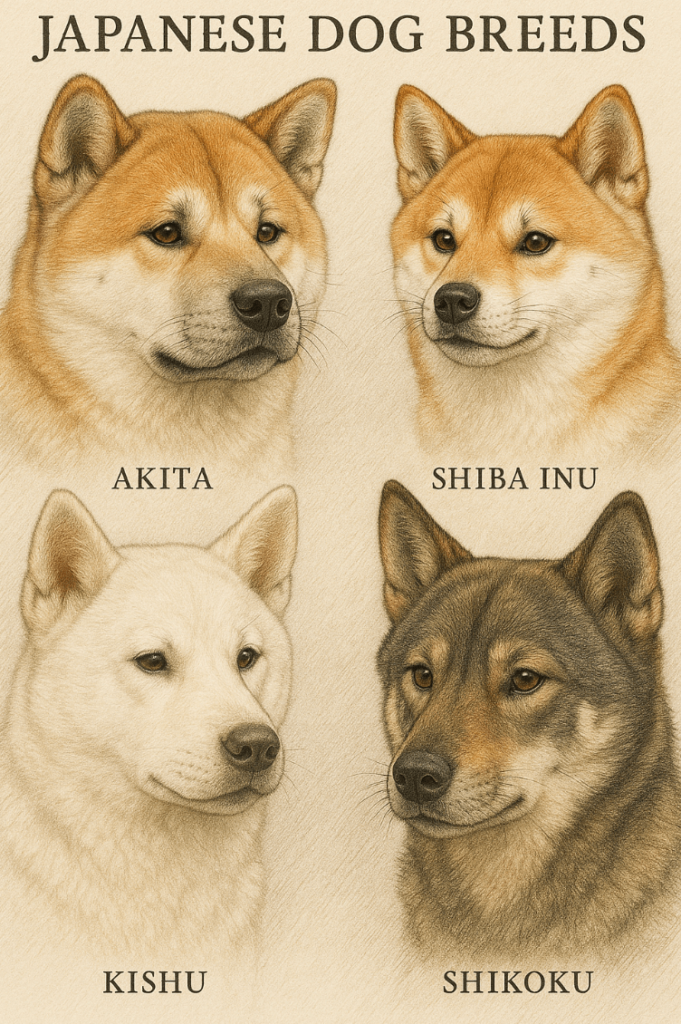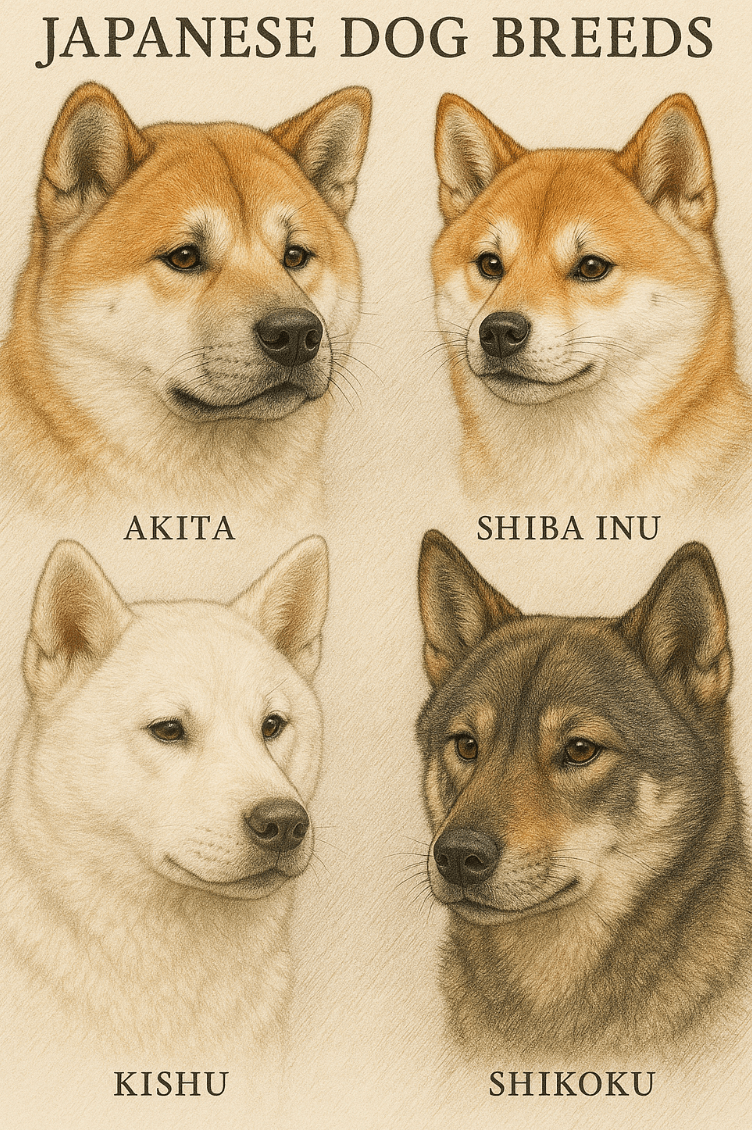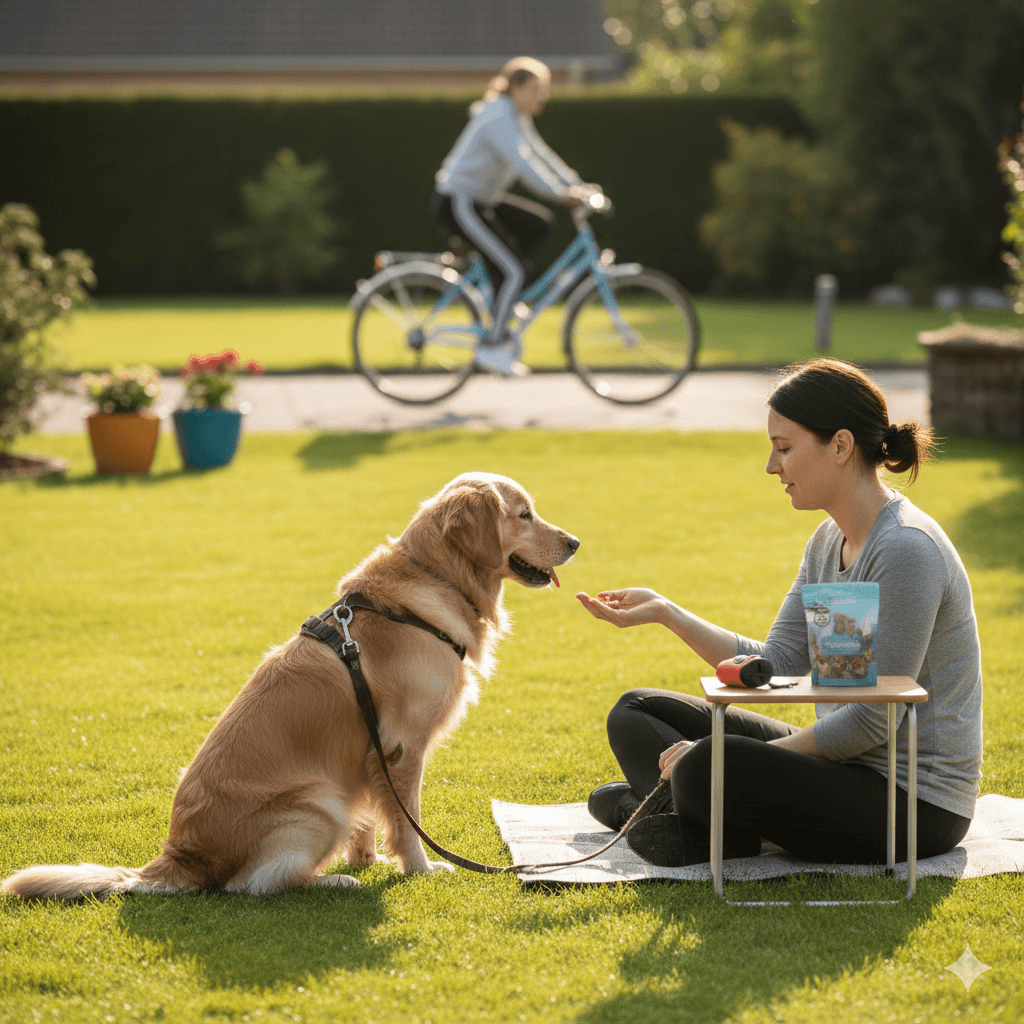Japanese Dog Breeds: A Celebration of Heritage and Loyalty
Japan is home to some of the most distinctive and beloved dog breeds in the world. Known for their loyalty, intelligence, and unique appearances, these dogs are deeply rooted in Japanese culture and history. From the iconic Akita Inu to the spirited Shiba Inu, Japanese dog breeds embody a blend of elegance, resilience, and companionship. Whether you’re a seasoned dog enthusiast or simply curious about these remarkable canines, exploring their origins, characteristics, and care requirements will deepen your appreciation for these four-legged treasures. Let’s dive into the fascinating world of Japanese dog breeds and discover what makes them so special.
Popular Japanese Dog Breeds and Their Unique Traits
Japanese dog breeds are celebrated for their striking features and distinct personalities. Here’s an overview of some of the most popular breeds and what sets them apart.
Akita Inu:
Known for their dignified demeanor and unwavering loyalty, Akitas are often associated with Hachiko, the legendary loyal dog.Shiba Inu:
Compact, fox-like, and fiercely independent, Shiba Inus are famous for their spirited nature and expressive faces.Kai Ken:
Also known as the “Tiger Dog,” this rare breed is prized for its brindle coat and exceptional hunting skills.Shikoku Ken:
Originally bred for boar hunting, Shikokus are agile, intelligent, and deeply connected to their owners.Hokkaido Ken:
Hardy and resilient, this breed thrives in cold climates and is renowned for its protective instincts and endurance.
Each of these breeds reflects Japan’s rich cultural heritage and offers a unique set of qualities that appeal to different types of dog lovers.
Caring for Japanese Dog Breeds: Key Considerations
Owning a Japanese dog breed comes with specific responsibilities to ensure their health, happiness, and well-being. Here are some essential tips for providing proper care.
Dietary Needs:
Feed a balanced diet tailored to their size, activity level, and age. Many Japanese breeds thrive on high-quality proteins and grains.Exercise Requirements:
These active dogs need daily physical activity, including walks, playtime, and mental stimulation to prevent boredom.Grooming Routine:
Most Japanese breeds have short, dense coats that require regular brushing to reduce shedding and maintain shine.Training and Socialization:
Early training and socialization are crucial to managing their independent streaks and fostering good behavior.Health Monitoring:
Schedule regular vet check-ups to monitor for breed-specific conditions like hip dysplasia or allergies.
By addressing these needs, you can ensure a harmonious and fulfilling relationship with your Japanese dog breed.
Check this guide 👉Romanian Dog Breeds: Best 7 Expert Tips!
Check this guide 👉Irish Dog Breeds: Best 7 Expert Tips!
Check this guide 👉Hispanic Dog Breeds: Best 7 Expert Tips!

Characteristics of Japanese Dog Breeds | Care Tips for Owners |
|---|---|
Loyal and protective nature | Provide consistent training and structure |
Independent and intelligent mindset | Offer plenty of mental and physical exercise |
Short, weather-resistant coats | Brush regularly to manage shedding |
Strong prey drive | Secure outdoor spaces to prevent escapes |
Deep cultural significance | Learn about their history to appreciate their traits |
Training Tips for Japanese Dog Breeds
Training a Japanese dog breed requires patience, consistency, and an understanding of their independent nature. Follow these tips to build a strong bond and encourage desirable behaviors.
Start Early:
Begin training and socialization during puppyhood to establish trust and prevent behavioral issues later.Use Positive Reinforcement:
Reward-based methods, such as treats and praise, work best to motivate these intelligent and sensitive dogs.Be Firm but Gentle:
While they respect authority, harsh discipline can damage their confidence. Maintain a calm and assertive approach.Focus on Mental Stimulation:
Incorporate puzzle toys, scent games, and advanced commands to challenge their sharp minds and prevent boredom.Address Stubbornness Strategically:
If they resist commands, redirect their focus and reward small successes to gradually overcome stubborn tendencies.
With dedication and kindness, training becomes a rewarding experience that strengthens your connection with your Japanese breed.
The Cultural Significance of Japanese Dog Breeds
Japanese dog breeds are more than just pets—they are symbols of national pride and cultural heritage. Understanding their historical roles deepens our appreciation for these remarkable canines.
Guardians of Homes:
Breeds like the Akita were traditionally used to protect families and property, earning a reputation for loyalty and vigilance.Hunting Companions:
Dogs like the Kai Ken and Shikoku Ken were bred for hunting game, showcasing their agility, endurance, and tracking abilities.National Treasures:
Several Japanese breeds, including the Akita and Shiba Inu, are designated as Natural Monuments of Japan, highlighting their cultural importance.Symbolic Representations:
The Akita represents loyalty, while the Shiba Inu embodies resourcefulness and adaptability—qualities admired in Japanese society.Modern-Day Ambassadors:
Today, these breeds serve as global ambassadors of Japanese tradition, captivating hearts worldwide with their charm and character.
Their cultural legacy adds depth to their identity, making them cherished companions for generations.
Common Misconceptions About Japanese Dog Breeds
While Japanese dog breeds are beloved worldwide, several misconceptions persist. Clarifying these myths ensures realistic expectations for potential owners.
They Are All Small Dogs:
While breeds like the Shiba Inu are compact, others, like the Akita, are large and powerful.They Are Easy to Train:
Their intelligence is matched by their independence, requiring patience and persistence during training.They Don’t Shed Much:
Despite their short coats, many Japanese breeds shed heavily, especially during seasonal changes.They Are Naturally Friendly:
While loyal to their families, some breeds can be reserved or aloof with strangers without proper socialization.All Japanese Breeds Are Rare:
While some, like the Kai Ken, are uncommon, others, like the Shiba Inu, are widely available.
Understanding these truths helps set the stage for a successful relationship with your Japanese dog.
Fun Facts About Japanese Dog Breeds
Japanese dog breeds are full of surprises, from their quirky habits to their storied pasts. Here are some fun facts to deepen your admiration for these incredible canines.
Shiba Inus Have a “Shiba Scream”:
When upset or excited, Shiba Inus emit a unique high-pitched scream that’s both amusing and unmistakable.Akitas Inspired Global Fame:
The story of Hachiko, the loyal Akita, has been immortalized in films and statues worldwide, symbolizing unwavering devotion.Kai Kens Are Excellent Climbers:
Known for their agility, Kai Kens can scale trees and rocky terrains with ease—a nod to their hunting origins.Shikokus Are Natural Athletes:
Bred for mountainous terrain, Shikokus excel in activities like hiking, agility courses, and even search-and-rescue missions.Hokkaido Kens Are Cold-Weather Experts:
Their thick double coats allow them to thrive in freezing temperatures, making them ideal companions for snowy climates.
These fascinating traits highlight the versatility and charm of Japanese dog breeds.
Finding the Right Japanese Dog Breed for You
Choosing the perfect Japanese dog breed depends on your lifestyle, preferences, and ability to meet their needs. Consider these factors to find your ideal match.
Living Space:
Smaller breeds like the Shiba Inu adapt well to apartments, while larger breeds like the Akita need more room to roam.Activity Level:
High-energy breeds like the Shikoku Ken require active owners who enjoy outdoor adventures, while others are content with moderate exercise.Experience Level:
First-time owners may prefer easier-to-manage breeds like the Hokkaido Ken, while experienced handlers can tackle the challenges of a Shiba Inu.Family Dynamics:
Some breeds, like the Akita, are fiercely protective of children, while others may be better suited for adults-only households.Time Commitment:
All Japanese breeds require attention, grooming, and training, so ensure you can dedicate sufficient time to their care.
By carefully evaluating these aspects, you’ll find a Japanese dog breed that complements your life and brings endless joy.
Frequently Asked Questions About Japanese Dog Breeds
Are Japanese dog breeds suitable for first-time owners?
Some breeds, like the Shiba Inu, can be challenging due to their independence, but others, like the Hokkaido Ken, are more adaptable.
Do they get along with other pets?
Proper socialization is key; many Japanese breeds have strong prey drives and may not always coexist peacefully with smaller animals.
How much grooming do they require?
Most breeds have low-maintenance coats, requiring weekly brushing and occasional baths.
Are they good family dogs?
Yes, many Japanese breeds are loyal and protective, making them excellent family companions when trained and socialized properly.
What health issues should I watch for?
Common concerns include hip dysplasia, allergies, and eye conditions; regular vet visits help ensure long-term health.
Embracing the Legacy of Japanese Dog Breeds
Japanese dog breeds are a testament to the beauty of combining tradition, loyalty, and companionship. Their unique personalities, striking appearances, and rich cultural heritage make them stand out among the world’s dog breeds. Whether you choose a Shiba Inu for their playful antics or an Akita for their steadfast devotion, owning one of these dogs is a journey filled with love, learning, and mutual respect. By honoring their history and meeting their needs, you’ll create a lifelong bond that celebrates the timeless connection between humans and dogs.
How to Desensitize a Dog: Best 7 Expert Tips! – Learn step-by-step methods to help your dog overcome fears and build confidence safely.
Cat Postpartum Depression: Best 7 Expert Tips! – Learn to spot signs, support your cat, and ensure a healthy bond with her kittens during recovery.
Dog Postpartum Depression: Best 7 Expert Tips! – Learn to spot symptoms, support your dog’s recovery, and ensure a healthy bond with her puppies.
Pemphigus Erythematosus in Cats: Best 7 Expert Tips! – Learn to recognize symptoms, manage flare-ups, and improve your cat’s quality of life.





